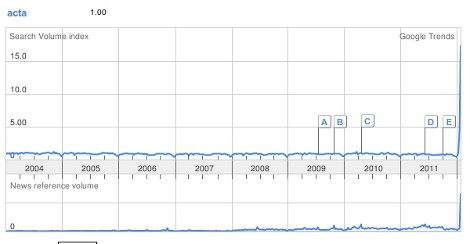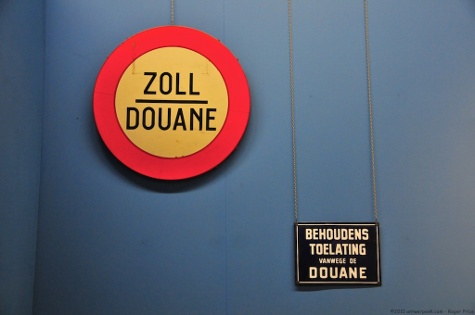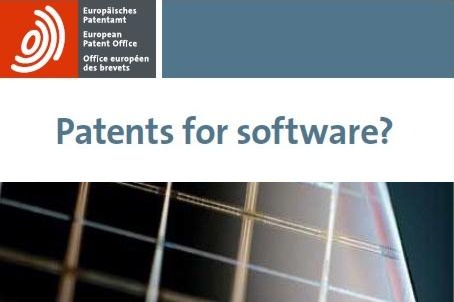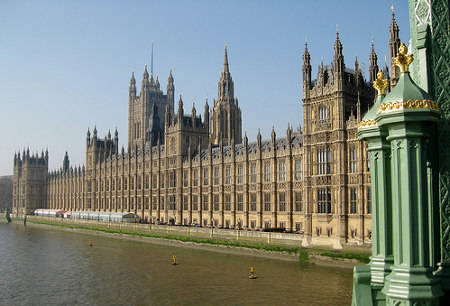As should be well known to everyone working on patents, copyright, trade marks and the like, the Anti-Counterfeiting Trade Agreement (ACTA) is a plurilateral agreement for the purpose of establishing international standards for intellectual property rights enforcement. In an earlier post on this blog I had reported in October last year on preparations for signing and ratification of ACTA in the EU, predicting that an epic battle on the ratification of ACTA is looming. Meanwhile, the Agreement has been signed on behalf of 31 Member States and on behalf of the EU as well.
It is absolutely safe to state that the public debate on ACTA has not calmed down. To the contrary, tensions are soaring as demonstrated by the Google Trends graph shown above: Just in these weeks and days the public interest in ACTA related matters as perceived by Google search engine has increased dramatically; look at the leading slope near the right-hand border of the plot. Fueled by real or imaginative parallels to the SOPA and PIPA Bills recently stalled in the U.S., broader circles of those parts of the general public engaged in Internet politics had a closer look into the ACTA matter, and many were not amused. Twitter timelines are buzzing with statements of discontent concerning ACTA; in Germany, protest demonstrations are scheduled to happen on February 11, 2012. In Poland, protest demonstrations with tens of thousands of participants have already been reported during past days (see also another video here).On January 26, Mr Kader Arif, the rapporteu for ACTA in the respective Committee of the European Parliament, stepped down, dismissing the entire political process of the creation of ACTA as follows:
“I condemn the whole process which led to the signature of this agreement: no consultation of the civil society, lack of transparency since the beginning of negotiations, repeated delays of the signature of the text without any explanation given, reject of Parliament’s recommendations as given in several resolutions of our assembly.”
As ACTA is considered to be a Mixed Agreement interfering with EU competences as well as with national ones it needs ratification not only by the EU Parliament on behalf of the European Union but also of each one of the 27 national Parliaments on behalf of each one of the EU Member States. Hence, starting later this year, we shall be entertained by watching a sort of a round dance of a political ratification theatre on a total of 28 stages including the European Parliament. And in many, if not in all EU Member States, a strong opposition will take the chance to push for a general debate on IP politics.
In some of the EU Member States the ACTA dispute may assist the respective national branch of the Pirate Party to enter the Parliament. Current polls on federal level say that the German branch of the Pirate Party may expect around 5% share of the votes for the lower chamber of the German Parliament (“Bundestag”). A broad grassroots movement fueld by protest against ACTA could well help them pass the 5% quorum hurdle. In view of the perceivable decay of the Liberal Democratic Party (“Freie Demokratische Partei”, FDP) which hangs around 3%, the German Piratenpartei might not only see chances to gain seats in the 2013 general elections but also to become junior coalition partner in a future German Government.

Absent of any reliable source the tea leaves give some cryptic clues: Munich on schedule, London delayed, Paris vanished?
The story so far. As we all know, the talks on the new EU-wide patent infrastructure (consisting basically of the Unitary Patent Regulation and the Unified Patent Court Agreement) run aground in late December despite quite some rounds of negotiations producing encouraging press releases according to which the so called ‘EU Patent Package’ was considered “broadly accepted in substance”. However, at the end of the Polish EU Presidency‘s half-year term, the adoption of the “Warsaw Patent Convention” – a term coined by Polish Deputy Prime Minister Pawlak – could not be celebrated as expected due to ongoing dissension.
Even though it was spread after the failed Competitiveness Council of December 5/6 through semi-official channels (e.g. tweets and press report) that the whole deal was almost done and only the seat of the central division of the Unified Patent Court remained to be decided, real doubts and harsh criticism almost immediately occurred and stakeholders saw an opportunity to again open the discussion on various substantive legal issues (see e.g. EPLAW resolution, FICPI position paper), such as on Articles 6 to 9 of the Regulation (effects of patents) that require substantive patent law to be subject to review by the CJEU.
Despite ongoing controversies and criticism (“desaster“, “bound to fail“) as to substantive issues, the politicians declared the dice cast for the Unitary Patent so that the Regulation was not unwrapped again for negotiations as to the legal merits. In fact, the Regulation for the Unitary Patent meanwhile got a green light from the powerful legal committee (JURI) of the EU Parliament in late December and the EU Council began to linguistically finalise the Regulation text in early January.
On May 30, 2011, the EU Council had published Document 10880/11 conveying a Proposal for a regulation of the European Parliament and of the Council concerning customs enforcement of intellectual property rights issued by the EU Commission under reference COM(2011) 285 final on May 26, 2011. The gist of this proposal was summarised within the Document as follows:
Continue reading »
During the past 15 years the Boards of Appeal of the EPO have developed a consistent case law as to the pragmatic problem/solution approach for assessing patentability pursuent Art 52 -57 EPC. In our earlier overview on
EPO case law regarding patentability of software inventions,
to which this posting is meant as a more practical continuation, we briefly characterised the EPO’s main examination approach:
[M]odern case law [of the EPO Boards of Appeal on software inventions], especially the suggestion in T 1173/97 that the “technical contribution” is an inventive step consideration and the observation in some early cases (e.g. T 38/86 and T 65/86) that the “inventive contribution” must lie in a “field of technology”, almost naturally lead to the problem-solution approach as developed in T 641/00 (COMVIK) and T 258/03 (Hitachi) and theoretically justified in T 154/04 (Duns).
This approach nowadays is the crucial test to differentiate between a technical contribution implementing a non-technical concept (e.g. a business method) and an inventive contribution in a technical field (e.g. an embedded control software). Its general idea is that only the technical features of a claim may be taken into account for assessing inventive step, while the non-technical features form a basis for formulating the underlying problem, with the effect that the non-technical features may render the technical solution obvious.
This approach is widely accepted among practitioners as enhancing legal security for applicants since it represents a comprehensible benchmark against which EPO decisions are subject to verifiction.
José Manuel Durão Barroso, President of the European Commission, has delivered a Statement on the occasion of a meeting with Helle Thorning-Schmidt, Prime Minister of Denmark, on January 12, 2012:
The same goes for a common unitary patent in Europe! Frankly we are almost there; there are now some divisions between France, Germany and Britain on things that are not so difficult. We can finalise the Community patent that we have been discussing for 30 years so it is about time to come to a solution and I know that Denmark will put its influence to find a solution.
Apparently this is something like a morale-boosting slogan, a rallying call, pep talk. We shall wait and see what really will happen during the coming months of the Danish EU Presidency.
Meanwhile the European Scrutiny Committee of the UK House of Commons uttered concerns that some of the draft plans for a single EU-wide patent system could disadvantage UK small businesses, Out-Law.com reports.
In detail, the conclusions of the Committee were not very favourable:
Continue reading »
This is just a brief notice concerning the envisaged Regulation of the European Parliament and of the Council implementing enhanced cooperation in the area of the creation of unitary patent protection. As we all know, the past Polish EU Presidency was not successful in delivering a final compromise on one of the other main components of the EU patent package, the Agreement on the creation of a Unified Patent Court. At least the question of where to put the seat of the Central Division could not be answered, and other issues might be unresolved as well. The incoming Danish EU Presidency extending from January to July 2012 obviously is determined to carry on with that task.
Just now the linguistic secretariat of the EU Council has sent out Document CM 1068/12 conveying an invitation addressing the Jurists/Linguists Group of the Council, summoning Members thereof to meet on January 26, 2012, in order to finalize the text of the Regulation of the European Parliament and of the Council implementing enhanced cooperation in the area of the creation of unitary patent protection (PE-CONS 72/11 – 2011/0093 (COD)) from a legal and linguistic point of view.
In my view this is an indication that dice is cast with regard to the political issues surrounding the Regulation. We shall wait and see if the Danish Presidency also can surmount the obstacles still barring the partners of the enhanced cooperation from finding a political solution with regard to the UPC Agreement.
The k/s/n/h::law blog
Some of the patent attorneys of the KSNH law firm have joined their efforts to research what is going on in the various branches of IP law and practice in order to keep themselves, their clients as well as interested circles of the public up to date. This blog is intended to present results of such efforts to a wider public.
Blog Archives
- November 2013 (2)
- October 2013 (1)
- September 2013 (1)
- August 2013 (2)
- July 2013 (3)
- June 2013 (5)
- March 2013 (5)
- February 2013 (4)
- January 2013 (5)
- December 2012 (5)
- November 2012 (5)
- July 2012 (5)
- June 2012 (8)
- May 2012 (5)
- April 2012 (3)
- March 2012 (4)
- February 2012 (5)
- January 2012 (6)
- December 2011 (12)
- November 2011 (9)
- October 2011 (9)
- September 2011 (4)
- August 2011 (7)
- July 2011 (4)
- June 2011 (1)
Blog Categories
- business methods (6)
- EPC (7)
- EPO (12)
- EU law (92)
- ACTA (8)
- CJEU (4)
- Comitology (1)
- competition law (2)
- Enforcement (6)
- EU Unified Patent Court (62)
- FTA India (1)
- TFEU (2)
- Trade Marks (5)
- European Patent Law (37)
- German Patent ACt (PatG) (1)
- German patent law (5)
- Germany (6)
- Pirate Party (3)
- International Patent Law (4)
- PCT (2)
- IP politics (10)
- licenses (2)
- Litigation (5)
- Patentability (7)
- Patents (12)
- Piratenpartei (2)
- Software inventions (10)
- Uncategorized (9)
- Unitary Patent (24)
- US Patent Law (4)
Comments
- kelle on Germany: Copyright Protection More Easily Available For Works Of “Applied Arts”
- Time Limits & Deadlines in Draft UPCA RoP: Counting The Days - KSNH Law - Intangible.Me on Wiki Edition of Agreement on Unified Patent Court Agreement (UPCA)
- Time Limits & Deadlines in Draft UPCA RoP: Counting The Days | ksnh::law on Wiki Edition of Agreement on Unified Patent Court Agreement (UPCA)
- Wiki Edition of Agreement on Unified Patent Cou... on Wiki Edition of Agreement on Unified Patent Court Agreement (UPCA)
- European Commission Takes Next Step Towards Legalising Software Patents in Europe | Techrights on EU Commission publishes Proposal of amendend Brussels I Regulation for ensuring Enforcement of UPC Judgements
Blogroll
- 12:01 Tuesday
- America-Israel Patent Law
- Anticipate This!
- AwakenIP
- BlawgIT
- BLOG@IPJUR.COM
- BP/G Radio Intellectual Property Podcast
- Broken Symmetry
- Class 46
- Director's Forum: David Kappos' Public Blog
- Gray on Claims
- I/P UPDATES
- IAM Magazine Blog
- Intellectual Property Intelligence Blog
- IP Asset Maximizer Blog
- IP CloseUp
- IP Dragon
- IP Watch
- IP Watchdog
- IPBIZ
- ipeg
- IPKat
- ITC 337 Law Blog
- Just a Patent Examiner
- K's Law
- MISSION INTANGIBLE
- Patent Baristas
- Patent Circle
- Patent Docs
- Patently Rubbish
- PatentlyO
- Patents Post-Grant
- Reexamination Alert
- SPICY IP
- Tangible IP
- The 271 Patent Blog
- The Intangible Economy
- THE INVENT BLOG®
- Think IP Strategy
- Tufty the Cat
- Visae Patentes
The KSNH blogging landscape


This blog and the German-language sister blog k/s/n/h::jur link to the two popular and privately run blogs IPJur und VisaePatentes and continue their work and mission with a widened scope and under the aegis of our IP law firm.
ksnhlaw on Twitter
- No public Twitter messages.
 KSNH::JUR Feed (german)
KSNH::JUR Feed (german)- Ist Verschlüsselung passé? September 6, 2013Auf verschiedenen Feldern beruflicher Praxis ist dafür zu sorgen, dass Kommunikation vertraulich bleibt. Die trifft beispielsweise für Ärzte zu, aber auch für Anwälte, darunter auch Patentanwälte. Einer der zahlreichen Aspekte, die in diesem Zusammenhang eine Rolle spielen, ist die Technik, um die Vertraulichkeit beruflicher Kommunikation sicherzustellen. Wa […]
- EU-Einheitspatent: Demonstrativer Optimismus und Zahlenmystik allerorten – Naivität oder politische Beeinflussung? June 26, 2013Nach mehreren vergeblichen Anläufen zur Schaffung eines EU-weiten Patentsystems wurde 1973 als Kompromiss das Europäische Patentübereinkommen unterzeichnet, welches unabhängig von der seinerzeit noch EWG genannten Europäischen Union System zur zentralisierten Patenterteilung mit nachgeordnetem Einspruchsverfahren durch das Europäische Patentamt schuf. Wie wi […]
- Moderne Zeiten oder: DPMA und Patentgericht streiten über die elektronische Akte April 25, 2013Bekanntlich hat das Deutsche Patent- und Markenamt (DPMA) im Jahre 2013 mit der rein technischen Fertigstellung der Einrichtungen zur elektronischen Akteneinsicht einen wichtigen Meilenstein seines Überganges von der Papierakte zur “elektronischen Akte” erreicht. Im DPMA werden aber bereits seit dem 01. Juni 2011 Patente, Gebrauchsmuster, Topografien und erg […]
- Gutachten zu Forschung, Innovation und technologischer Leistungsfähigkeit Deutschlands 2013 March 11, 2013Unter dem Datum vom 28. Februar 2013 ist die Bundestags-Drucksache 17/12611 veröffentlicht worden Sie trägt den Titel Unterrichtung durch die Bundesregierung - Gutachten zu Forschung, Innovation und technologischer Leistungsfähigkeit Deutschlands 2013. Die Bundesregierung legt dem Deutschen Bundestag seit dem Jahr 2008 […]
- 3D-Printing: Zum Filesharing von 3D-Modelldaten February 25, 2013In meiner kleinen zuvor angekündigten Reihe über rechtliche Aspekte des 3D Printing komme ich heute auf die Frage zu sprechen, ob die Hersteller von Gerätschaften es hinnehmen müssen, wenn Ersatztreile davon – vom Brillengestell über Smartphone-Gehäuseteile bis hin zu Rastenmähermotor-Abdeckungen – gescannt und die daraus […]
- Ist Verschlüsselung passé? September 6, 2013








